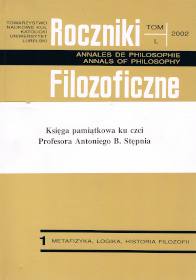Poznanie i byt. Z epistemologii Wilfrida Sellarsa
Abstrakt
Wilfrid Sellars very often expounds his philosophical views in an historical context. In his paper „Being and Being Known” Sellars gives a succinct account of his epistemology while at the same time discussing the Thomistic conception of sensory and intellectual knowledge. His aim in that paper is to provide a plausible interpretation of the doctrine that both the senses and the intellect are informed by the nature of external objects, and thus our cognitive acts are isomorphic with their objects. Sellars claims that there are two dimensions to that isomorphism, and that those separate dimensions are conflated by the Thomists, as well as by other philosophers. That is to say, there is isomorphism in the real or the natural order, and there is isomorphism in the intentional or the logical order. Sellars insists that in sensory cognition isomorphism holds merely in the real order. By contrast, intellectual knowledge is based upon the isomorphism of the intentional order. However, that isomorphism obtains in virtue of specific relations holding in the real order. Thus those two orders are intimately connected. Unfortunately, Sellars does not fully elaborate the nature of the connections between those two orders. I argue that in light of his commitment to ontological naturalism, Sellars should claim that ultimately there is only one isomorphism, namely the isomorphism in the real order. I suggest that his insistence that there are no genuine semantical relations holding between the elements of the intentional and the real supports such an interpretation.
Bibliografia
De Vries W. A., Triplett T. (2000), Knowledge, Mind, and the Given: Reading Wilfrid Sellars's „Empiricism and the Philosophy of Mind”, Indianapolis: Hackett.
Haldane J. (1997), Forms of Thought, w: The Philosophy of Roderick M. Chisholm, ed. L. E. Hahn, Chicago: Open Court, s. 149-170.
McDowell J. (1998), Having the World in View: Sellars, Kant, and Intentionality [The Woodbridge Lectures 1997], „The Journal of Philosophy”, 95, s.431-491.
McDowell J. (1999), Sellars's Transcendental Empiricism, w: Rationalität, Realismus, Revision, Hrsg. J. Nida-Rümelin, Berlin: De Gruyter, s. 42-51.
Sellars W. (1963), Science, Perception and Reality, London: Routledge & Kegan Paul.
Sellars W. (1968), Science and Metaphysics: Variations on Kantian Themes, London: Routledge & Kegan Paul.
Sellars W. (1975), Autobiographical Reflections, w: Action, Knowledge and Reality: Critical Studies in Honor of Wilfrid Sellars, ed. H.-N. Castañeda, Indianapolis: Bobbs-Merrill, s. 277-293.
Stępień A. B. (1978), Aktualne spory o naturę i rolę poznania, „Zeszyty Naukowe KUL”, 21, nr 1, s. 34-39 [przedruk w: A. B. Stępień, Studia i szkice filozoficzne, t. I, Lublin: RW KUL 1999, s. 108-114].
Copyright (c) 2002 Roczniki Filozoficzne

Utwór dostępny jest na licencji Creative Commons Uznanie autorstwa – Użycie niekomercyjne – Bez utworów zależnych 4.0 Międzynarodowe.





